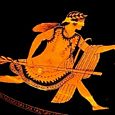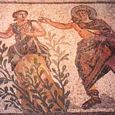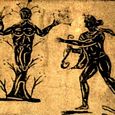DAPHNE
Greek Name
Δαφνη
Transliteration
Daphnê
Latin Spelling
Daphne
Translation
Laurel (daphnê)
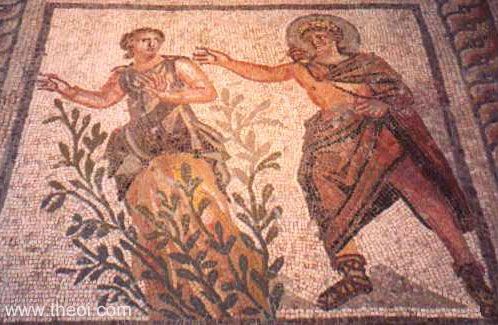
DAPHNE was a Naiad-nymph of the river Ladon of Arkadia or the Peneios (Peneus) in Thessalia. She was loved by the god Apollon who pursued her until she grew exhausted and cried out to Gaia (Gaea) for help. The goddess transformed into a laurel tree which Apollon then adopted as his sacred plant.
In a festival at Delphoi (Delphi), a branch of a sacred laurel tree was brought to the shrine from the Thessalian vale of Tempe. This rite would suggest that the Thessalian version of the Daphne myth was the oldest.
The Delphians also had a closely related myth about a certain Daphnis who they describe as the Oreiad-nymph prophetess of Gaia at the shrine before Apollon assumed control.
FAMILY OF DAPHNE
PARENTS
[1] LADON (Pausanias 10.7.8, Philostrarus Life of Apoll. of Tyana 1.16, Statius Thebaid 4.289, Nonnus Dionysiaca 42.386)
[2] PENEIOS (Hyginus Fabulae 203, Ovid Metamorphoses 1.452)
[3] AMYCLAS (Diodorus of Elaea Frag, Phylarchus Frag, Parthenius Love Romances 15)
ENCYCLOPEDIA
DAPHNE (Daphnê), a fair maiden who is mixed up with various traditions about Apollo. According to Pausanias (x. 5. § 3) she was an Oreas and an ancient priestess of the Delphic oracle to which she had been appointed by Ge. Diodorus (iv. 66) describes her as the daughter of Teiresias, who is better known by the name of Manto. She was made prisoner in the war of the Epigoni and given as a present to Apollo. A third Daphne is called a daughter of the rivergod Ladon in Arcadia by Ge (Paus. viii. 20. § 1; Tzetz. ad Lycoph. 6; Philostr. Vit. Apollon. i. 16), or of the river-god Peneius in Thessaly (Ov. Met. i. 452; Hygin. Fab. 203), or lastly of Amyclas. (Parthen. Erot. 15.) She was extremely beautiful and was loved and pursued by Apollo. When on the point of being overtaken by him, she prayed to her mother, Ge, who opened the earth and received her, and in order to console Apollo she created the ever-green laurel-tree (daphnê), of the boughs of which Apollo made himself a wreath. Another story relates that Leucippus, the son of Oenomaüs, king of Pisa, was in love with Daphne and approached her in the disguise of a maiden and thus hunted with her. But Apollo's jealousy caused his discovery during the bath, and he was killed by the nymphs. (Paus. viii. 20. § 2; Parthen. l. c.) According to Ovid (Met. i. 452, &c.) Daphne in her flight from Apollo was metamorphosed herself into a laurel-tree.
Source: Dictionary of Greek and Roman Biography and Mythology.
CLASSICAL LITERATURE QUOTES
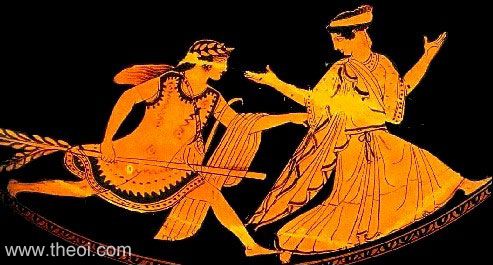
Parthenius, Love Romances 15 (trans. Gaselee) (Greek poet C1st B.C.) :
"From the elegiac poems of Diodoros of Elaia [unknown date] and the twenty-fifth book of Phylarkhos (Phylarchus) [Greek historian C3rd B.C.] :
This is how the story of Daphne, the daughter of Amyklas (Amyclas), is related. She used never to come down into the town, nor consort with the other maidens; but she got together a large pack of hounds and used to hunt, either in Lakonia (Laconia), or sometimes going into the further mountains of the Peloponnese. For this reason she was very dear to Artemis, who gave her the gift of shooting straight. On one occasion she was traversing the country of Elis, and there Leukippos (Leucippus), the son of Oinomaus (Oenomaus), fell in love with her; he resolved not to woo her in any common way, but assumed women's clothes, and, in the guise of a maiden, joined her hunt. And it so happened that she very soon became extremely fond of him, nor would she let him quit her side, embracing him and clinging to him at all times. But Apollon was also fired with love for the girl, and it was with feelings of anger and jealousy that he saw Leukippos always with her; he therefore put it into her mind to visit a stream with her attendant maidens, and there to bathe. On their arrival there, they all began to strip; and when they saw that Leukippos was unwilling to follow their example, they tore his clothes from him: but when they thus became aware of the deceit he had practiced and the plot he had devised against them, they all plunged their spears into his body. He, by the will of the gods, disappeared; but Daphne, seeing Apollon advancing upon her, took vigorously to flight; then, as he pursued her, she implored Zeus that she might be translated away from mortal sight, and she is supposed to have become the bay tree which is called daphne after her."
Pausanias, Description of Greece 8. 20. 2 (trans. Jones) (Greek travelogue C2nd A.D.) :
"The Ladon [of Arkadia (Arcadia)] is the most lovely river in Greece, and is also famous for the legend of Daphne that the poets tell . . . Leukippos (Leucippus) fell in love with Daphne, but despaired of winning her to be his wife by an open courtship, as she avoided all the male sex. The following trick occurred to him by which to get her. Leukippos was growing his hair long for the river Alpheios (Alpheus). Brading his hair as though he were a maiden, and putting on woman's clothes, he came to Daphne and said that he was a daughter of Oinomaos (Oenomaus), and would like to share her hunting. As he was thought to be a maiden, surpassed the other maidens in nobility of birth and skill in hunting, and was besides most assiduous in this attentions, he drew Daphne into a deep friendship. The poets who sing of Apollon's love for Daphne make an addition to the tale; that Apollon became jealous of Leukippos because of his success in his love. Forthwith Daphne and the other maidens conceived a longing to swim in the Ladon, and stripped Leukippos in spite of his reluctance. Then, seeing that he was no maid, they killed him with their javelins and daggers."
Pausanias, Description of Greece 10. 7. 8 :
"The reason why a crown of laurel is the prize for a Pythian victory is in my opinion simply and solely because the prevailing tradition has it that Apollon fell in love with the daughter of Ladon [i.e. Daphne]."
Philostratus, Life of Apollonius of Tyana 1. 16 (trans. Conybeare) (Greek biography C1st to C2nd A.D.) :
"[In Antiokhos (Antioch), Asia Minor is] the temple of Apollon Daphnaios (Daphnaeus, Of the Laurel), to which the Assyrians attach the legend of Arkadia (Arcadia). For they say that Daphne, the daughter of Ladon, there underwent her metamorphosis, and they have a river flowing there, the Ladon, and a laurel tree is worshipped by them which they say was substituted for the maiden."
Pseudo-Hyginus, Fabulae 203 (trans. Grant) (Roman mythographer C2nd A.D.) :
"When Apollo was pursuing the virgin Daphne, daughter of the river Peneus, she begged for protection from Terra (Earth) [Gaia], who received her, and changed her into a laurel tree. Apollo broke a branch from it and placed it on his head."
Ovid, Metamorphoses 1. 452 ff (trans. Melville) (Roman epic C1st B.C. to C1st A.D.) :
"Daphne Peneia (Daughter of Peneus) was the first love of great Phoebus [Apollon], a love not lit by chance unwitting, but by Cupido's (Love's) [Eros'] spiteful wrath. Delius [Apollon], proud in victory saw Cupido [Eros] draw his bow's taut arc, and said : ‘Mischievous boy, what are a brave man's arms to you? That gear becomes my shoulders best. My aim is sure; I wound my enemies, I wound wild beasts; my countless arrows slew but now the bloated Python, whose vast coils across so many acres spread their blight. You and your loves! You have your torch to light them Let that content you; never claim my fame!’ And Venus' [Aphrodite's] son [Eros] replied : ‘Your bow, Phoebus, may vanquish all, but mine shall vanquish you. As every creature yields to power divine, so likewise shall your glory yield to mine.’
Then winging through the air his eager way he stood upon Parnasos' shady peak, and from his quiver's laden armoury he drew two arrows of opposing power, one shaft that rouses love and one that routs it. The first gleams bright with piercing point of gold; the other, cull and blunt is tipped with lead. This one he lodged in Nympha Peneis' [Daphne's] heart; the first he shot to pierce Apollo to the marrow. At once he loves; she flies the name of love, delighting in the forest's depths, and trophies of the chase, a Nympha to vie with heaven's virgin huntress Phoebe [Artemis]; a careless ribbon held her straying hair. Many would woo her; she, rejecting them all, manless, aloof, ranged the untrodden woods nor cared what love, what marriage rites might mean. Often her father [the River-God Peneios (Peneus)] said, ‘My dearest daughter, it is my due to have a son-in-law.’ Often her father said, ‘It is my due, child of my heart, to be given grandchildren.’
She hated like a crime the bond of wedlock and, bashful blushes tingeing her fair cheeks, with coaxing arms embraced him and replied : ‘My dear, dear father grant I may enjoy virginity for ever; this Diana [Artemis] was granted by her father.’
He, indeed, yielded, but Daphne--why, her, loveliness thwarts her desire, her grace denies her prayer. Phoebus saw her, loved her, wanted her--her for his bride, and, wanting, hoped--deceived by his own oracles; and, as the stubble flames in the harvest fields or as a hedge catches alight when some late wayfarer chances his torch too close or, in the dawn, discards its smouldering embers, so love's fire consumed the god, his whole heart was aflame, and high the hopes that stoked his fruitless passion. He sees the loose disorder of her hair and thinks what if it were neat and elegant! He sees her eyes shining like stars, her lips--but looking's not enough!--her fingers, hands, her wrists, her half-bare arms--how exquisite! And sure her hidden charms are best! But she flies swifter than the lightfoot wind nor stops to hear him calling : ‘Stay, sweet Nympha Peneis (Peneid Nymph)! Oh, stay! I am no foe to fear. Lambs flee from wolves and hinds from lions, and the fluttering doves from eagles; every creature flees its foes. But love spurs my pursuit. Oh, you will fall and briars graze your legs--for shame!--and I, alas, the cause of your distress! The ground you race across is rough. You run too fast! Check your swift flight, and I'll not chase so fast. Yet ask who loves you. No rough forester am I, no unkempt shepherd guarding his flocks an herds. You do not know--you fly, you madcap girl, because you do not know. I am the lord of Delphi; Tenedos and Patara and Claros are my realms. I am the son of Juppiter [Zeus]. By me things future, past and present are revealed; I shape the harmony of songs and strings. Sure are my arrows, but one surer still has struck me to the heart, my carefree heart. The art of medicine I gave the world and all men call me "Healer"; I possess the power of every herb. Alas! That love no herb can cure, that skills which help afford to all mankind fail now to help their lord!’
More he had tried to say, but she in fear fled on and left him and his words unfinished. Enchanting still she looked--her slender limbs bare in the breeze, her fluttering dress blown back, her hair behind her streaming as she ran; and flight enhanced her grace. But the young god, could bear no more to waste his blandishments. And (love was driving him) pressed his pursuit. And as a beagle sees across the stubble a hare and runs to kill and she for life--he almost has her; now, yes now, he's sure she's his; his straining muzzle scrapes her heels; and she half thinks she's caught and, as he bites, snatches away; his teeth touch--but she's gone. So ran the god and girl, he sped by hope and she by fear. But he, borne on the wings of love, ran faster, gave her no respite, hot on her flying heels and breathing close upon her shoulders and her tumbling hair. Her strength was gone; the travail of her flight vanquished her, and her face was deathly pale. And then she was at the river, swift Peneus, and called : ‘Help, father, help! If mystic power dwells in your waters, change me and destroy my baleful beauty that has pleased too well.’
Scarce had she made her prayer when through her limbs a dragging languor spread, her tender bosom was wrapped in thin smooth bark, her slender arms were changed to branches and her hair to leaves; her feet but now so swift were anchored fast in numb stiff roots, her face and had became the crown of a green tree; all that remained of Daphne was her shining loveliness. And still Phoebus loved her; on the trunk he placed his hand and felt beneath the bark her heart still beating, held in his embrace her branches, pressed his kisses on the wood; yet from his kisses the wood recoiled. ‘My bride,’ he said, ‘since you can never be, at least, sweet laurel, you shall be my tree. My lure, my locks, my quiver you shall wreathe.’ . . .
Thus spoke the god; the laurel in assent inclined her new-made branches and bent down, or seemed to bend, her head, her leafy crown."
Ovid, Heroides 15. 23 ff (trans. Showerman) (Roman poetry C1st B.C. to C1st A.D.) :
"Take up the lyre and quiver--you will be Apollo manifest . . . Phoebus [Apollon] loved Daphne."
Statius, Thebaid 4. 289 ff (trans. Mozley) (Roman epic C1st A.D.) :
"Ladon, almost, O Pythian [Apollon], the father of thy bride [Daphne]."
Nonnus, Dionysiaca 15. 310 ff (trans. Rouse) (Greek epic C5th A.D.) :
"Ah, how many a song sang Phoibos (Phoebus) [Apollon]! While Daphne heard him, but felt no pleasure at heart."
Nonnus, Dionysiaca 16. 356 ff :
"[The nymph Nikaia (Nicaea), who was raped by Dionysos in her sleep, accuses the Nymphs of failing to warn her :] ‘Alas for maidenhead, stolen by that vagabond Bakkhos (Bacchus)! Hamadryas Nymphai (Hamadryad Nymphs), whom shall I blame for Hypnos (Sleep), Eros (Love), trickery and wine, are the robbers of my maiden state! . . . Why did not Daphne (the Laurel) speak out--"Maiden, beware, drink not the deceiving water!"?’"
Nonnus, Dionysiaca 33. 210 ff :
"She told how the knees of that unwedded Nymphe [Daphne] fled swift on the breeze, how she ran once from Phoibos (Phoebus) [Apollon] quick as the north wind, how she planted her maiden foot by the flood of a longwinding river, by the quick stream of Orontes, when the Earth (Gaia) opened beside the wide mouth of a marsh and received the hunted girl into her compassionate bosom . . . the god never caught Daphne when she was pursued, Apollon never ravished her . . . and [he] always blamed Gaia (Earth) for swallowing the girl before she knew marriage."
Nonnus, Dionysiaca 42. 255 ff :
"Sing first Daphne, sing the erratic course of Ekho (Echo), and the answering note of the goddess who never fails to speak, for these two despised the desire of gods."
Nonnus, Dionysiaca 42. 386 ff :
"How the daughter of Ladon [Daphne], that celebrated river, hated the works of marriage and the Nymphe became a tree with inspired whispers, she escaped the bed of Phoibos (Phoebus) [Apollon] but she crowned his hair with prophetic clusters."
ANCIENT GREEK & ROMAN ART
SOURCES
GREEK
- Parthenius, Love Romances - Greek Mythography C1st B.C.
- Pausanias, Description of Greece - Greek Travelogue C2nd A.D.
- Philostratus, Life of Apollonius of Tyana - Greek Biography C2nd A.D.
- Nonnus, Dionysiaca - Greek Epic C5th A.D.
ROMAN
- Hyginus, Fabulae - Latin Mythography C2nd A.D.
- Ovid, Metamorphoses - Latin Epic C1st B.C. - C1st A.D.
- Ovid, Heroides - Latin Poetry C1st B.C. - C1st A.D.
- Statius, Thebaid - Latin Epic C1st A.D.
BIBLIOGRAPHY
A complete bibliography of the translations quoted on this page.
